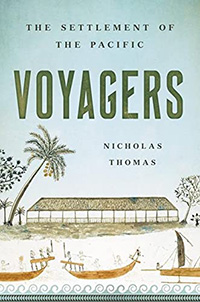 Nicholas Thomas, Voyagers: The Settlement of the Pacific (New York: Basic Books, 2021), 203pp.
Nicholas Thomas, Voyagers: The Settlement of the Pacific (New York: Basic Books, 2021), 203pp.
When the first Europeans started exploring the many South Pacific islands, beginning with Magellan who landed at Guam in 1521, they were shocked to find indigenous peoples there with sophisticated histories and cultures. They also observed both similarities and differences among the various peoples on the dozens of different islands of Polynesia, Melanesia, Micronesia, and the greater area known today as Oceania that is home to a dozen different countries. It was also clear that these people were master navigators across the vast expanse of ocean; they were "voyagers" who had populated the islands by intentional exploration and not mere accident, and they did so without the "advanced" technologies of the seventeenth century.
Who were these people? Where did they come from? How did they get there, thousands of miles from any continent? Nicholas Thomas's book "is about a civilization that has seldom been recognized as such," especially from a post-colonial perspective in which this Pacific expanse of archipelagoes is understood as having been shaped by the Islanders themselves.
These islands and peoples, it turns out, enjoy a 60,000 year history. The cave art at Sulawesi is among the oldest in the world (44,000 years ago). Thomas explores their material culture, comparative linguistics, agriculture, art, map-making, genetics, and anthropology to tease out their "bewilderingly diverse" identities. He summarizes the best contemporary research, and is cautious in his conclusions. Despite numerous scholarly gains, in many ways these people remain "a major enigma of human history."
At the end of his book, Thomas draws three "firm conclusions." First, the pursuit of these many questions is deeply cross cultural, with the Islanders sharing their long and sophisticated cultural knowledge about themselves with the West, and not just a unilateral effort by the West. Second, "in the deepest possible sense, human histories exhibit many strands and trajectories: they exemplify diversity." Third, these Islanders were not, strictly speaking, "cut off" from the world and in isolation. They were inter-islanders who "interacted extensively within and between archipelagoes," and most certainly with the Europeans once they arrived.
Nicholas Thomas is professor of historical anthropology at Cambridge University and Director of the Cambridge Museum of Archaeology and Anthropology. Voyagers was on numerous "best of the year" books for 2021.
Dan Clendenin: dan@journeywithjesus.net


